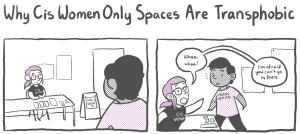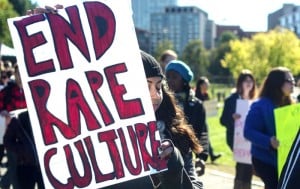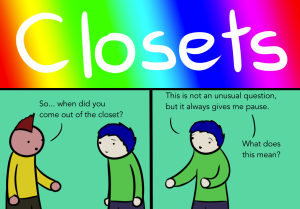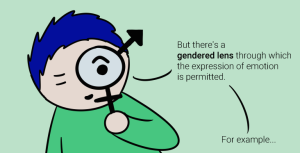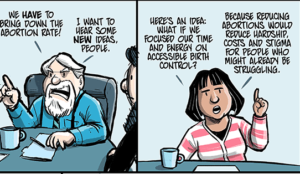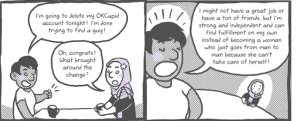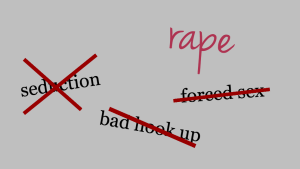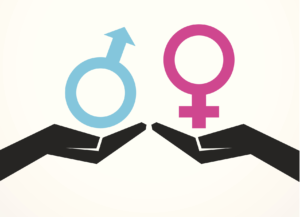I have PTSD, but PTSD isn’t rare. See, I come from a community of predominantly Black and Indigenous undocumented immigrants from all over the world, and PTSD is something that a lot of us struggle with.
As (un)documented immigrants, we have been forced to migrate out of our homes.
Some of us migrate because international corporations came to our villages, built factories, polluted our water, destroyed our ecosystem, and, therefore, eradicated our access to healthy foods and safe working conditions.
Others come searching for refuge (from war, military invasion, and so on). Some arrive to ask for political asylum (for anti-LGBTQIA+ violence in their countries, murders against women, and so on). Others come because they were trafficked, and some come without the intention of staying.
My point is being undocumented isn’t something that just happens.
Undocumentedness is a painful experience rooted in oppressive powers that make living conditions so atrocious in one’s home country that those who are most affected have to flee – if they don’t die – and find a life elsewhere.
Once we do migrate – most undocumented people migrate “legally,” and then lose status – life becomes even harder.
Because we aren’t protected under the law, most of us are seen as cheap labor. Factories, farms, manufacturers, homeowners, restaurants, businesses, and so on want our labor, but only if we agree to be overworked, underpaid, and go uninsured.
The immigration system isn’t broken. The immigration system created the “illegal alien,” because the US (as an empire) depends on our labor in order to continue to grow as a capitalist and modern society.
The US depends on our labor the same way in which it depended on slave labor, on the colonization of Indigenous land, and on the exploitation of female bodies.
Under the new presidential administration, we have witnessed anti-immigrant rhetoric that portrays immigrants as violent to society and in need of deportation. This rhetoric is strategic.
First, it allows white people to feel okay about their xenophobia, racism, and anti-blackness.
aSecond, this rhetoric makes immigrants so afraid that they actually become easier to control. And, third, this rhetoric allows for immigration to continue to work the way that it was designed to work: to label some immigrants good, while others bad.
This dichotomy of good immigrant/ bad immigrant is set up to uphold values of white supremacy, settler-colonialism, capitalism and anti-Blackness.
This rhetoric, however, has also intensified the amount of fear, anxiety and vulnerability in our communities. It’s for this reason that I write. I want all of you (documented or not) to know that your life matters, and that we aren’t powerless.
I want to affirm that whatever you’re feeling isn’t an exaggeration. You have a right to your feelings.
I hope that this piece helps alleviate some of the public panic we’ve experienced and turns panic into resistance.
1. Being Scared Isn’t a Weakness
There have been few moments in my life where I truly felt that I was hopeless.
The first moment was in 2010 when my family couldn’t afford heat during the Boston winters. I thought we wouldn’t survive. I was scared.
However, my family made it through. Our fright forced us to be creative. We learned to all sleep in the same room, to wear layers to bed, and we learned how to hold each other tight.
That was in 2010, and seven years later, I’ve learned that being scared isn’t a weakness. As immigrants, we have a right to be scared.
We currently live in a xenophobic society that judges us based on our skin color, our accent, our religion, and our culture. So, yes, being scared is normal.
In this article, I don’t mean to normalize fear.
Instead, I mean to expose the fact that – under the structures of settler-colonialism, racism, and anti-Blackness – Black and Indigenous people and other people of color are among the most vulnerable populations, and therefore, live with a lot of fear.
However, that can change. We can turn our fear into power. Fear is a war tactic that forces marginalized communities to feel weak.
To counter our fear and self-doubt, we must learn that we’re powerful – power is waking up and acknowledging each other’s struggles.
Power is being honest when we need help. Power is admitting that we have messed up, and thinking of ways to move forward. Power is learning to be in community with one another.
Fear is an emotion we can regulate and transform into power.
2. You Can Checkout of Social Media
Let’s face it, there’s a lot of public panic in social media.
In order for us to continue fighting, we might have to get off social media. Maybe just for a week, a weekend, one day, or two hours!
As my colleague, Sian Ferguson explains in an article about online activism:“While your work is so important, it’s entirely possible for you to take a break from social media and pass the baton onto other activists.”
When you checkout of social media because you are becoming more and more anxious about the state of our communities, what you’re actually doing is taking care of yourself.
Tuning out of social media – even if only for an hour – is a form of resistance that allows you to continue taking care of others and yourself.
For example, I have PTSD.
A few days ago, I opened my Facebook and saw a combination of the NDAPL camps being burned, immigrants being detained, and trans women being murdered. I was triggered. There was violence all over the news. I had to tune out.
When I tuned out, I called a friend, and we chatted for two hours. This friend made me reflect on what it was that I needed: I realized that I had been missing meals, and I realized that I wasn’t talking to anyone about how I was feeling.
Because I tuned out of social media, I was able to take care of myself, and then write this article!
3. You Don’t Have to Be at Every Protest (Or Any!)
As someone who came-of-age attending May 1st protests in my little neighborhood of East Boston, I have realized that protesting is only one form of community organizing and activism.
As a community organizer, I know that protests are key in bringing people together for a few hours, and send a direct message to either the local government, or an entire society.
However, as someone who is Black and also an immigrant, I know that I have a higher risk of being detained at a protest, imprisoned, and deported.
Therefore, protesting is only one form of community organizing.
I’ve realized I can also mobilize by regularly asking my immigrant community how they’re doing, if they’re being treated fairly at work, what they worry about, and how I can best use my privileges to help them.
Protesting is an effective strategy for activists, organizers, and artists to deliver powerful messages, but it’s not the only strategy available.
4. Your Familial, Romantic, and Intimate Relationships Are As Important As the Movement
This has been the hardest lesson I’ve had to learn in my years of organizing in the Immigrant Rights Movement.
In 2011, I remember talking to my friend Andres, and telling him that I was spending so much time traveling and talking about how much my mother and I had suffered as immigrants, that I wasn’t actually building a relationship with her. I remember telling him:
“If immigration reform happens, and we’re treated as equally as white immigrants, that doesn’t mean that I’ll all-of-a-sudden have an amazing relationship with my family.”
I realized that fighting for immigrant rights also means taking care of my intimate relationships. When I work to have healthier relationships with my mother, I’m actively participating in the Immigrant Rights Movement.
One of the largest struggles about being an immigrant is being displaced from home and having to work so much that family time becomes rare.
By finding moments to be with my family, friends, mentors, and romantic partners, what we’re doing is resisting the violence that immigration has created.
5. Making Art Is Militant Resistance
Artists in the Immigrant Rights Movement have been under appreciated. Without art, no social movement would ever be successful.
Think about it this way: In order to change a society’s culture, that society first needs to understand what’s wrong. In order to understand, they’ll need representation of the oppression.
This representation may come through the visual, the auditory, the literary, the culinary, and so on. Once the society is exposed to the issue (via art), then that society can be mobilized to a re-imagination of what an anti-oppressive culture could look like.
Engaging in art, therefore, is always a form of protest and militant resistance.
6. Finding Moments of Joy, Laughter and Love Are Necessary
Because being undocumented sometimes means living in flight-or-fight mode, we need to be able to find moments of joy, laughter, and love in order to continue fighting.
I’ve definitely had moments in my life when joy was a hard emotion to find. For example, one of my best friends and femmetors is currently in an immigrant detention center, where she’s been in-and-out of solitary confinement.
On a regular basis, I get calls from her, and we talk about the ways in which the immigration system is strategically designed to create exploitable labor, to incarcerate vulnerable communities, and to discipline those who are queer, trans, indigenous, Black and low-income. During these heavy conversations, joy is hard to find.
However, finding joy, laughter and love are emotions that we deserve. Oppression is most successful when violence makes us feel that we’re alone in the world and have no agency.
Joking around with people is a pleasurable action that we should not find guilt in. Having sex is something that should be liberating, not shameful. Enjoying the company of community is something we should be comfortable with, as opposed to finding it a rare occasion.
Point being, how do we expect to continue resisting if we can’t find moments of joy, laughter, and love in our lives?
7. It’s Okay to Take a Break and Want Alone Time
Let’s face it, it’s never been easy to be an immigrant. However, you should never feel guilty about wanting to take some time to listen to your body.
I know, with papers-please laws, Muslim bans, and immigration raids happening around our communities, the feeling of not being productive enough can consume us. Measuring ourselves based on productivity isn’t helpful though.
“Productivity” is actually a measurement of capitalism – and we, as immigrants, are always expected to “prove” our value and worth in the US.
This “proving” that we’re asked to do depends on the idea that as immigrants, we are only valuable if we can sell our labor to advance society, which in reality means big corporations.
We need to take care of each other and ourselves if we’re going to continue resisting.
8. You’re Loved by More People Than You Think
I’m not sure if everyone will relate to this, but within my close group of (un)documented friends, I’ve noticed that most of us have a hard time accepting compliments and love.
If you’re reading this, I want you to know that more people than you know love you.
Accepting love can be a long process sometimes. There are moments where we misrecognize love.
When someone asks you if you’re hungry, that’s a sign of radical love. When someone gives you a ride somewhere that’s also a sign of love. When someone is able to challenge you and make you think in different (and sometimes scary) ways, that’s a sign of love, too.
It’s important for us to be able to recognize those instances in our lives. By doing so, we’ll be more aware of the love that our community has for each other, and hold each other tighter when the time to resist harder comes.
9. Your Existence Is an Example of Historic Resistance
As a Black human being who was undocumented for seventeen years, I often find myself reading and rereading Frederick Douglass and Harriet Tubman’s slave narratives.
I do so because I see parts of my realities represented in their texts. In the moments of their texts when they write about being fugitives of the law, I understand what that means.
For me, slave catchers are manifested in what we now know as immigration agents.
These agents will go into immigrant households late at night, pick up our families, and throw them in vans. Then, our family members are sent to a prison, or immigrant detention center. For me, those “housing” facilities represent plantations.
As (un)documented immigrants, our everyday survival is actually a blueprint of resistance.
We need to share our realities with our communities, because there is incredible knowledge in the ways we have been able to thrive, when it seems that everything has been set up so that we don’t.
10. I Will Fight Next to You for Our Liberation
I know that most people reading this don’t know me, but I want to tell you that I’ll always be fighting next to you for our liberation. What that means is that you’ll never be alone.
I’m committed to developing a more compassionate practice of resistance and community organizing, which means taking care of myself as much as I can so that I’m better able to take care of my community.
Most of us don’t have access to the care that we need. Access to therapists that understand the complexities of our realities is rare. Working in an environment that affirms us and celebrates us is rare. Heck, sometimes, even access to affordable food and a place to sleep can be rare, too.
So, I commit to continue sharing my experiences. I commit to learning from you. I commit to continue re-imagining what radical resistance can look like.
[do_widget id=’text-101′]
Alan Pelaez Lopez is a Contributing Writer for Everyday Feminism and an Afro-Indigenous migrant from Oaxaca, Mexico. They write essays, poetry, and non-fiction pieces on Blackness, queerness and immigration. Alan is currently pursuing a PhD in Ethnic Studies and is a member of Familia: Trans, Queer Liberation Movement. Connect via their website, Instagram, Twitter, and check out their jewelry store. Read their articles here.
Search our 3000+ articles!
Read our articles about:
Our online racial justice training
Used by hundreds of universities, non-profits, and businesses.
Click to learn more







